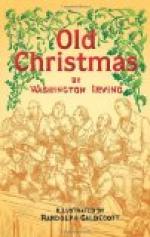All these superstitions, I found, had been very much countenanced by the Squire, who, though not superstitious himself, was very fond of seeing others so. He listened to every goblin tale of the neighbouring gossips with infinite gravity, and held the porter’s wife in high favour on account of her talent for the marvellous. He was himself a great reader of old legends and romances, and often lamented that he could not believe in them; for a superstitious person, he thought, must live in a kind of fairyland.
Whilst we were all attention to the parson’s stories, our ears were suddenly assailed by a burst of heterogeneous sounds from the hall, in which was mingled something like the clang of rude minstrelsy, with the uproar of many small voices and girlish laughter. The door suddenly flew open, and a train came trooping into the room, that might almost have been mistaken for the breaking up of the court of Fairy. That indefatigable spirit, Master Simon, in the faithful discharge of his duties as Lord of Misrule, had conceived the idea of a Christmas mummery, or masking; and having called in to his assistance the Oxonian and the young officer, who were equally ripe for anything that should occasion romping and merriment, they had carried it into instant effect. The old housekeeper had been consulted; the antique clothes-presses and wardrobes rummaged and made to yield up the relics of finery that had not seen the light for several generations; the younger part of the company had been privately convened from the parlour and hall, and the whole had been bedizened out, into a burlesque imitation of an antique masque.*
[10] See Note J.




